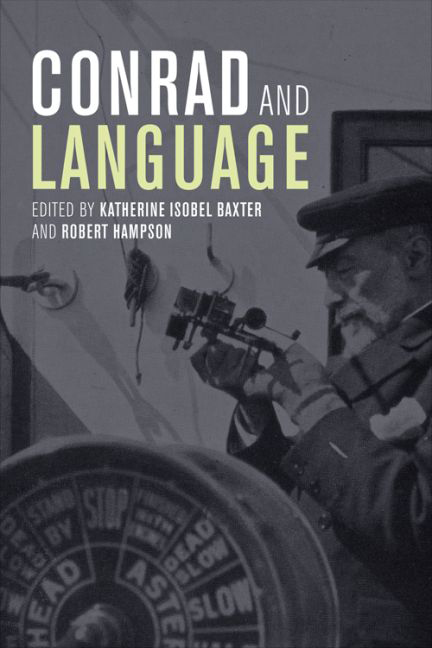Book contents
- Frontmatter
- Contents
- A Note on Texts
- Introduction
- 1 Conrad and Nautical Language: Flying Moors and Crimson Barometers
- 2 Navigating the ‘Terroristic Wilderness’: Conrad's Language of Terror
- 3 Conrad, G. E. Moore and Idealism
- 4 Conrad's Language of Passivity: Unmoving towards Late Modernism
- 5 The Powers of Speech in Conrad's Fiction
- 6 ‘Soundless as Shadows’: Language and Disability in the Political Novels
- 7 Conrad and Romanised Print Form: From Tuan Almayer to ‘Prince Roman’
- 8 Languages in Conrad's Malay Fiction
- 9 Gallicisms: The Secret Agent in Conrad's Prose
- 10 ‘The speech of my secret choice’: Language and Authorial Identity in A Personal Record
- 11 The Russian Redemption of The Secret Agent and Under Western Eyes
- Afterword
- Contributors
- Index
Afterword
Published online by Cambridge University Press: 12 September 2017
- Frontmatter
- Contents
- A Note on Texts
- Introduction
- 1 Conrad and Nautical Language: Flying Moors and Crimson Barometers
- 2 Navigating the ‘Terroristic Wilderness’: Conrad's Language of Terror
- 3 Conrad, G. E. Moore and Idealism
- 4 Conrad's Language of Passivity: Unmoving towards Late Modernism
- 5 The Powers of Speech in Conrad's Fiction
- 6 ‘Soundless as Shadows’: Language and Disability in the Political Novels
- 7 Conrad and Romanised Print Form: From Tuan Almayer to ‘Prince Roman’
- 8 Languages in Conrad's Malay Fiction
- 9 Gallicisms: The Secret Agent in Conrad's Prose
- 10 ‘The speech of my secret choice’: Language and Authorial Identity in A Personal Record
- 11 The Russian Redemption of The Secret Agent and Under Western Eyes
- Afterword
- Contributors
- Index
Summary
The chapters in this timely volume consider many junctures, many differences – not so much polarities as swirls of literary energy between and among spoken and unspoken, spoken and written, articulate and inarticulate, multinational and domestic; terms of art and terms of common discourse, heteroglossia and polyglossia, frankness and evasion, ontology and epistemology, the locutionary or illocutionary and the perlocutionary, Jawi and Rumi, Rumi and Cyrillic, manuscript and print. At the risk of sounding like Polonius heralding the players, one could say that these studies of Conrad and language mix in various proportions the aesthetic, philosophical, ethnographic, historical, ethical, cultural and geographical with the linguistic. The volume is timely because it speaks to current – and urgent – debates about transnationalism, cosmopolitanism, modernity, migrant cultures, translation, borders, cultural privilege and the rights to being seen and heard and read. It also speaks at a time of remapping Anglophone literatures in the spirit of these debates, epitomised in the title of Wai Chee Dimock's Through Other Continents: American Literature across Deep Time, exemplified in the tables of contents of English-language journals of modernist studies such as Modernism/modernity and Modernist Cultures, and demonstrated at length in a major study by Christopher GoGwilt, a contributor to this volume, who reads Conrad side by side with Jean Rhys and the Indonesian novelist (and political prisoner under both colonial and postcolonial regimes) Pramoedya Ananta Toer.
Why, in these various realignments and debates, is language so important? And why is Conrad so worth framing in these contexts? To begin with, there is the phenomenon of his linguistic formation. As other contributors note, he passed the first ten years of his life in the Russian Empire. Part of that time was spent in exile to Russia proper, but the rest was in, to give them their present-day names, Berdychiv, Zhytomyr and Chernihiv.
- Type
- Chapter
- Information
- Conrad and Language , pp. 204 - 212Publisher: Edinburgh University PressPrint publication year: 2016

